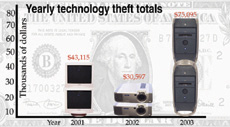
Despite the efforts the university has made to convert some learning spaces into “smart classrooms,” many classrooms are losing their “smarts” as a result of theft.
Jerry Warner, interim vice president for academic affairs and provost, sent a memo to faculty and staff on Oct. 31 after $8,000 worth of projectors and monitors was stolen from a smart classroom.
According to Jeff Butler, chief of the Department of Public Safety, there has been a dramatic increase in theft this year, especially in technology-related items.
Since 2001, $148,807 worth of technology equipment has been taken from campus. So far, the monetary amount stolen this year in technology-related thefts has increased over 245 percent from last year’s figures.
“Theft is the major crime problem on this campus,” Butler said. “It’s the single most prevalent crime we report and investigate.”
While Warner’s memo primarily focused on theft of technology, Butler stressed that it doesn’t stop there. Parking decals, credit cards, purses, book bags, cell phones and textbooks are among many other common items stolen across campus.
“It’s not a matter of just technology theft,” he said. “There is theft rampant across this campus.”
Recently, a 27-inch television was taken from the residential village. Last year, a couch and chair were taken out of the Nunn Hall faculty lounge.
However, with the high-dollar value of equipment in these “smart classrooms,” the recent technology theft is catching more attention.
Butler said that an easy solution would be to implement locks on all classroom doors. Many of the “smart classrooms” either aren’t locked regularly or don’t even have locks installed.
“This is where the problem lies with technology theft,” he said.
Although DPS has repeatedly requested this situation to be corrected, their pleas have been ignored, Butler said.
“Many of the faculty have suggested that students need access to the classrooms for the purposes of studying (and) using equipment during non-classroom hours, and they want to make that access available,” Butler said.
“And that is reasonable, but when things are being stolen, then it’s no longer so reasonable.”
DPS Operations Officer Jeff Martin sees a simple way to overcome this obstacle.
“We’re pretty free about coming in locking and unlocking doors so students have access,” Martin said, “but we know who’s in there.”
Warner’s memo also suggested that locks be put on classroom doors.
“Theft is a crime of opportunity, and if we eliminate opportunity, we’ll reduce criminal theft,” Butler said.
According to Butler, this applies to all situations, not just the recent theft of technology.
He said he often hears about personal belongings being stolen when the situation could easily have been avoided.
Theft is bound to happen when book bags are left unattended in University Center or valuables are left in unlocked lockers at the Albright Health Center, he said.
Butler even mentioned a recent scenario where a brand-new laptop was stolen out of the backseat of a convertible with its top down.
“If you make your property vulnerable to theft, there are people who will steal it,” he said.
“If you make it less vulnerable, they are less likely to have the opportunity to steal it.”
“(Thieves) go for the easy target,” Martin said. “They’re basically lazy people, or they’d be working for a living.”
The large sum stolen this past year is bound to have a big effect on the university, Butler said.
“While many of the theft losses of the university equipment is recouped through insurance claims, the insurance premiums rise accordingly,” Butler said, “and in the long haul, you’re going to suffer.”
Martin noted there is also a large consequence of the thefts that the insurance doesn’t cover – one’s education experience.
“(If) everything your professor was going to do that day revolved around technology, there’s a wasted day, a wasted entire class period, that you don’t get the benefit of. How do you put a price tag on that?” Martin said.
“You have to call off class for a day for a dumb reason – because somebody wouldn’t lock the door.”
Senior Jennifer Quammen is in a computer programming class that was robbed of its “smarts” before the semester even started.
“In a programming class it is difficult to understand the concepts without seeing the programs executed during the lecture,” she said.
“I’ve gotten used to ‘smart classrooms’ in the science building and now am ready to learn with the assistance of computers,” she said.
Dr. Donald Galli, professor of Quammen’s computer programming class, sees how the theft of his classroom’s equipment has an effect on the class.
“It’s sort of frustrating,” Galli said. “If I had the equipment, I could actually demonstrate the programs. So now I can’t do that. I just say, ‘This is what they would do.'”
Butler and Martin said that everyone on campus can help out with the growing problem of theft.
“Students, faculty, and staff need to take personal responsibility to see that opportunity for theft does not exist,” Butler said. “We have to all work together to prevent the problem. Everybody has to collectively work towards making this a less opportunistic environment for theft.”
“If you see something that doesn’t look right, please call us,” Martin said.
“We’d rather go check out something silly than not check something out and have someone steal something.”
Crimes can also be reported anonymously on the DPS website.
“If you see somebody steal something, you have an obligation to do something about it; you can’t just turn your head and ignore it,” Butler said.
“The next time it may be your property.”

